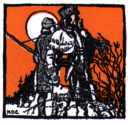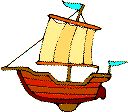Thomas Jefferson: Voice of Independence Part 3: Presidency and Legacy
Another significant accomplishment of Jefferson's first term was the victory over the Barbary pirates, who had been menacing American shipping in the Mediterranean Sea for a number of years but were forced to surrender to the tiny yet valiant American navy and Marines. With a great popularity, Jefferson was re-elected in 1804. He hoped for a quiet second term. He didn't get his wish. The Aaron Burr affair blew up in Jefferson's face. Burr tried to get himself elected governor of New York so he and other New England Federalists could take their states out of the Union. Why? They feared that a Democratic-Republican majority would take away the rights of the northeastern establishment. Hamilton again opposed Burr, this time exposing the treasonous plot. The result was the famous duel, in which Burr killed Hamilton. Burr was finally caught, arrested, and tried for treason. A sympathetic judge and jury acquitted him.
The Napoleonic Wars raged on, but the Jeffersonian presidency ended in 1809. Thomas Jefferson retired from public life for good--or so he thought. His successors, James Madison and James Monroe, continued to consult him for advice. Jefferson was a great inventor. He received numerous patents. Many of them are on display at his home, Monticello, which he also designed. In 1815, he sold his entire libary--more than 6,400 books--to Congress to replace the books the British had destroyed when they burned the Capitol during the War of 1812.
A short year later, he died. First page > Rise to Fame > Page 1, 2, 3 Graphics courtesy of ArtToday |
|
Social Studies for Kids
copyright 2002–2026
David White

 He
immediately set about reducing the role of the federal
government in people's lives.Thus it might have seemed
strange when he acted without Congressional approval to buy
the whole of the Louisiana Territory. Jefferson had argued
vigorously that the federal government did not have such
powers when Alexander Hamilton (as President George
Washington's Secretary of the Treasury) had wanted to open
the Bank of the United States. Yet, Jefferson, in his own
words, "stretched the Constitution till it cracked." The
He
immediately set about reducing the role of the federal
government in people's lives.Thus it might have seemed
strange when he acted without Congressional approval to buy
the whole of the Louisiana Territory. Jefferson had argued
vigorously that the federal government did not have such
powers when Alexander Hamilton (as President George
Washington's Secretary of the Treasury) had wanted to open
the Bank of the United States. Yet, Jefferson, in his own
words, "stretched the Constitution till it cracked." The
 Jefferson,
meanwhile, had more important things to deal with: war
between Great Britain and France. Like his two predecessors,
Jefferson was determined to keep the United States out of
war. He even convinced Congress to pass the
Jefferson,
meanwhile, had more important things to deal with: war
between Great Britain and France. Like his two predecessors,
Jefferson was determined to keep the United States out of
war. He even convinced Congress to pass the  Jefferson's
final lasting achievement was the creation of the University
of Virginia, which opened in 1825. Jefferson oversaw the
creation of the buildings and the curriculum and supervised
the hiring of faculty and selection of library books.
Jefferson's
final lasting achievement was the creation of the University
of Virginia, which opened in 1825. Jefferson oversaw the
creation of the buildings and the curriculum and supervised
the hiring of faculty and selection of library books.

